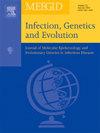Molecular characterization and clinical insights into feline chaphamaparvovirus (FeChPV) in cats from Thailand
IF 2.6
4区 医学
Q3 INFECTIOUS DISEASES
引用次数: 0
Abstract
Feline chaphamaparvovirus (FeChPV) is a recently discovered parvovirus in cats that is linked to respiratory and enteric diseases. Notably, FeChPV is also detected in healthy cats, warranting further investigation into its clinical significance. This study aimed to assess the presence of FeChPV in cats across Thailand while also exploring its genetic characteristics through phylogenetic, recombination, and selective pressure analyses. Molecular investigations were performed on oropharyngeal swabs from both healthy (n = 165) and diseased (n = 167) cats. The findings revealed an FeChPV detection rate of 10.2 % (34/332), with the virus detected in both healthy (9.1 %, 15/165) and diseased cats (11.4 %, 19/167). However, no significant association was observed between these conditions and the presence of FeChPV (p = 0.5879). Among the FeChPV-positive cases, 61.8 % (21/34) exhibited concurrent detection with common feline viruses. Apart from oropharyngeal swab samples, FeChPV was also detected in additional clinical samples, including nasal swabs, auricular swabs, rectal swabs, and urine samples. Phylogenetic analysis of the complete coding sequence indicated that most FeChPV strains in this study clustered into a single clade, except for BKK052 and CB050. Two recombinant strains (C14 and HF2) from China were found, in which FeChPV CB050 Thai strain served as putative minor and major parents, respectively. The NS1 and VP1 codon sequences underwent negative selective pressure, with multiple positive selection sites observed. Although a specific disease associated with FeChPV infection could not be concluded, underlying health conditions may increase susceptibility to FeChPV infection. Further research is essential to comprehensively understand the role of this virus in feline health.

泰国猫chaphamparvovirus (FeChPV)的分子特征和临床研究。
猫chaphamparvovirus (FeChPV)是最近在猫身上发现的一种与呼吸道和肠道疾病有关的细小病毒。值得注意的是,在健康猫中也检测到FeChPV,值得进一步研究其临床意义。本研究旨在评估泰国猫中FeChPV的存在,同时通过系统发育、重组和选择压力分析探索其遗传特征。对健康猫(n = 165)和患病猫(n = 167)的口咽拭子进行了分子调查。结果显示,FeChPV的检出率为10. %(34/332),在健康猫(9.1 %,15/165)和病猫(11.4 %,19/167)中均检测到病毒。然而,这些情况与FeChPV的存在之间没有明显的关联(p = 0.5879)。在fechpv阳性病例中,61.8 %(21/34)与常见猫病毒同时检测。除了口咽拭子样本外,还在其他临床样本中检测到FeChPV,包括鼻拭子、耳拭子、直肠拭子和尿液样本。完整编码序列的系统发育分析表明,除BKK052和CB050外,本研究中大多数FeChPV株聚集在一个分支中。从中国分离到2株重组菌株(C14和HF2),其中泰国菌株FeChPV CB050分别推定为主要亲本和次要亲本。NS1和VP1密码子序列存在负选择压力,存在多个正选择位点。虽然与FeChPV感染相关的特定疾病尚未确定,但潜在的健康状况可能会增加对FeChPV感染的易感性。要全面了解这种病毒在猫科动物健康中的作用,进一步的研究是必不可少的。
本文章由计算机程序翻译,如有差异,请以英文原文为准。
求助全文
约1分钟内获得全文
求助全文
来源期刊

Infection Genetics and Evolution
医学-传染病学
CiteScore
8.40
自引率
0.00%
发文量
215
审稿时长
82 days
期刊介绍:
(aka Journal of Molecular Epidemiology and Evolutionary Genetics of Infectious Diseases -- MEEGID)
Infectious diseases constitute one of the main challenges to medical science in the coming century. The impressive development of molecular megatechnologies and of bioinformatics have greatly increased our knowledge of the evolution, transmission and pathogenicity of infectious diseases. Research has shown that host susceptibility to many infectious diseases has a genetic basis. Furthermore, much is now known on the molecular epidemiology, evolution and virulence of pathogenic agents, as well as their resistance to drugs, vaccines, and antibiotics. Equally, research on the genetics of disease vectors has greatly improved our understanding of their systematics, has increased our capacity to identify target populations for control or intervention, and has provided detailed information on the mechanisms of insecticide resistance.
However, the genetics and evolutionary biology of hosts, pathogens and vectors have tended to develop as three separate fields of research. This artificial compartmentalisation is of concern due to our growing appreciation of the strong co-evolutionary interactions among hosts, pathogens and vectors.
Infection, Genetics and Evolution and its companion congress [MEEGID](http://www.meegidconference.com/) (for Molecular Epidemiology and Evolutionary Genetics of Infectious Diseases) are the main forum acting for the cross-fertilization between evolutionary science and biomedical research on infectious diseases.
Infection, Genetics and Evolution is the only journal that welcomes articles dealing with the genetics and evolutionary biology of hosts, pathogens and vectors, and coevolution processes among them in relation to infection and disease manifestation. All infectious models enter the scope of the journal, including pathogens of humans, animals and plants, either parasites, fungi, bacteria, viruses or prions. The journal welcomes articles dealing with genetics, population genetics, genomics, postgenomics, gene expression, evolutionary biology, population dynamics, mathematical modeling and bioinformatics. We also provide many author benefits, such as free PDFs, a liberal copyright policy, special discounts on Elsevier publications and much more. Please click here for more information on our author services .
 求助内容:
求助内容: 应助结果提醒方式:
应助结果提醒方式:


